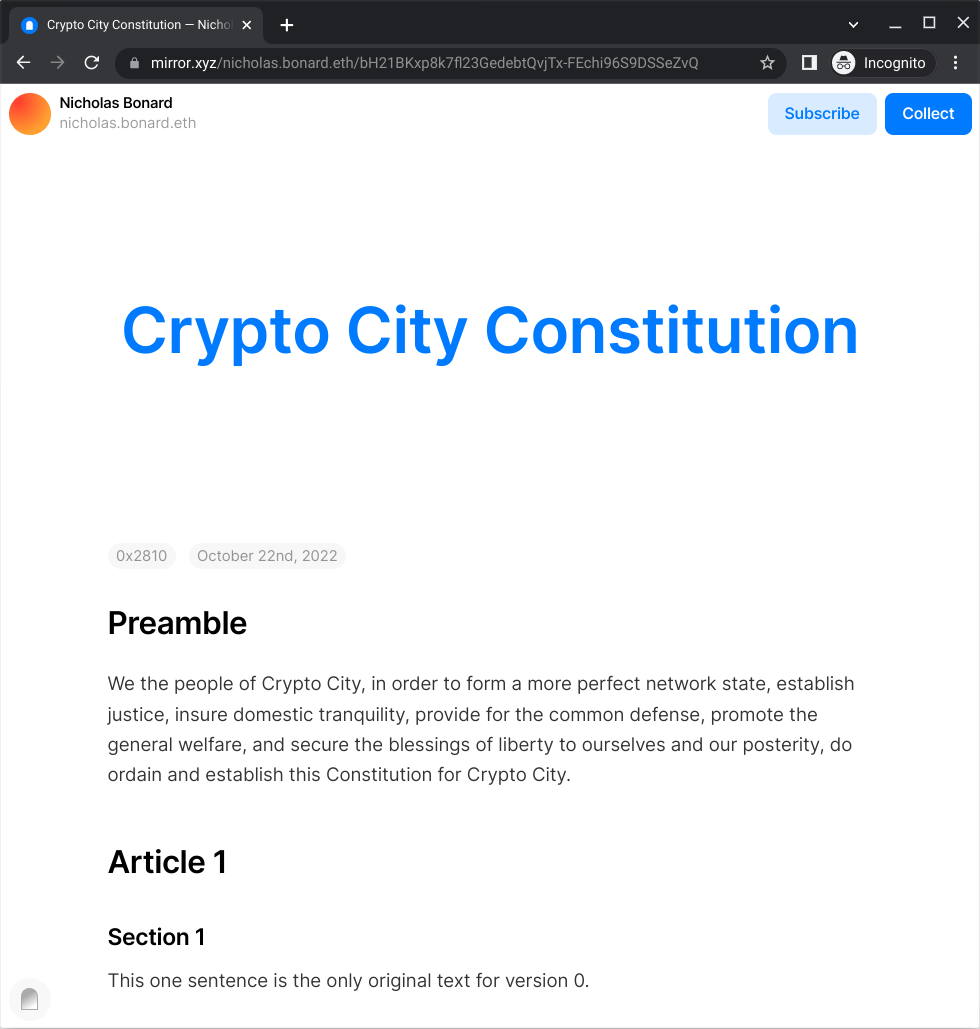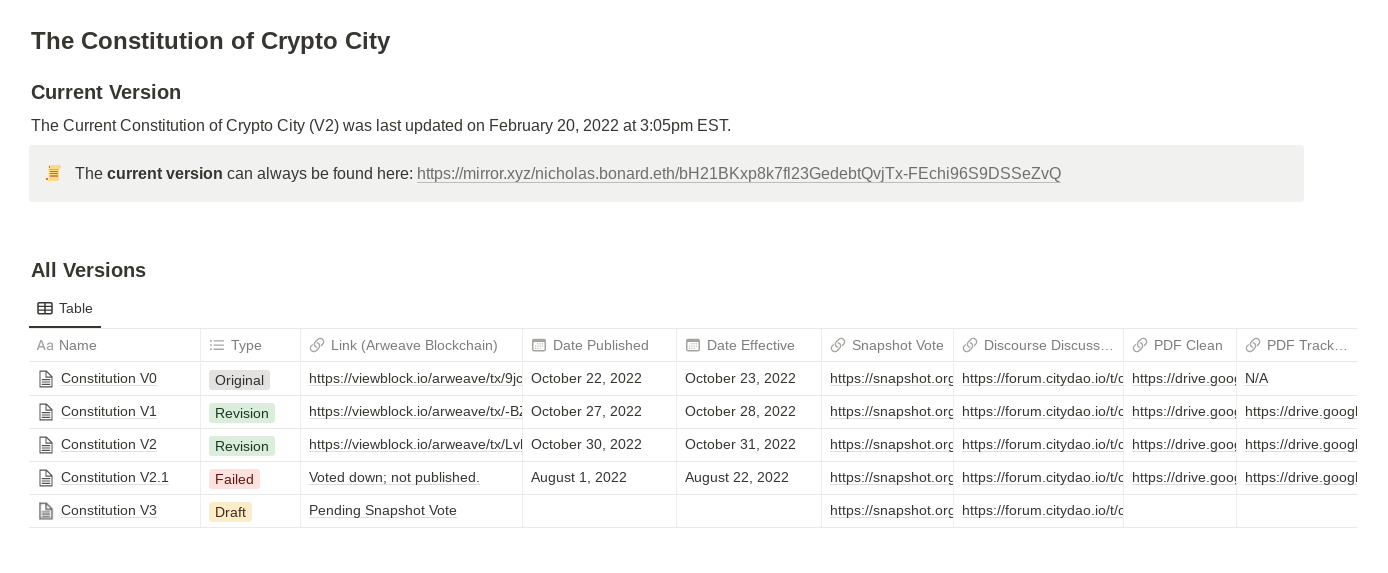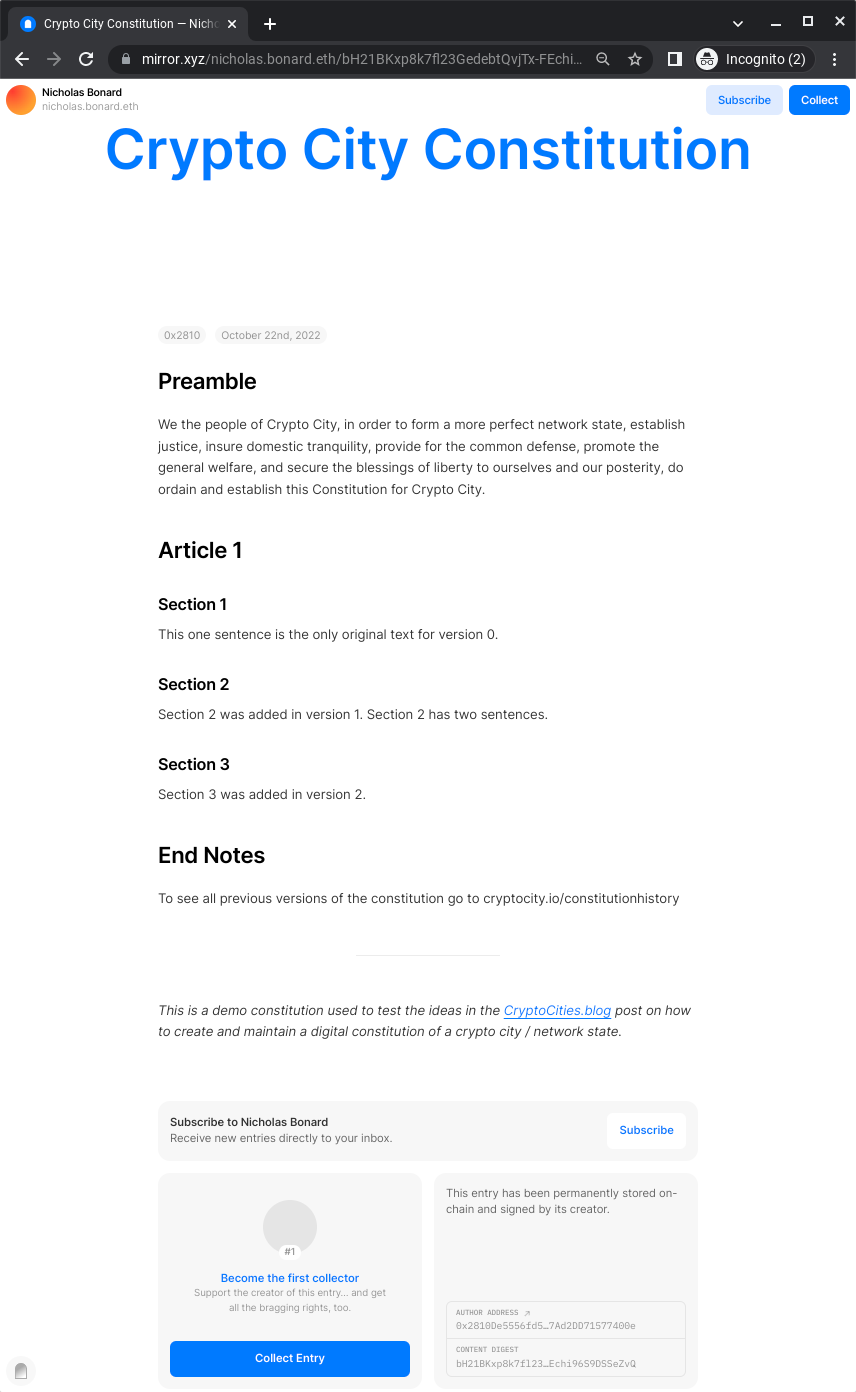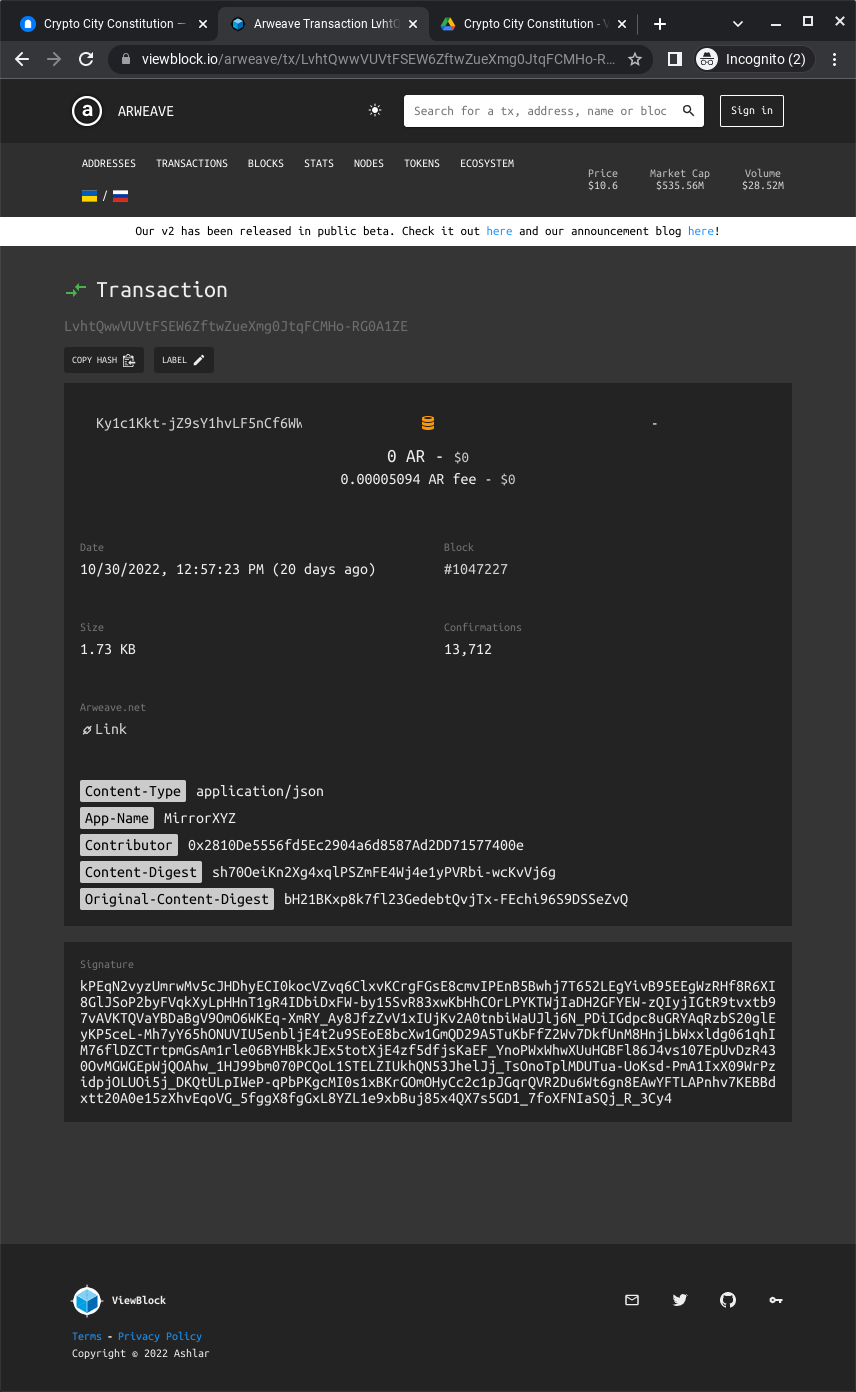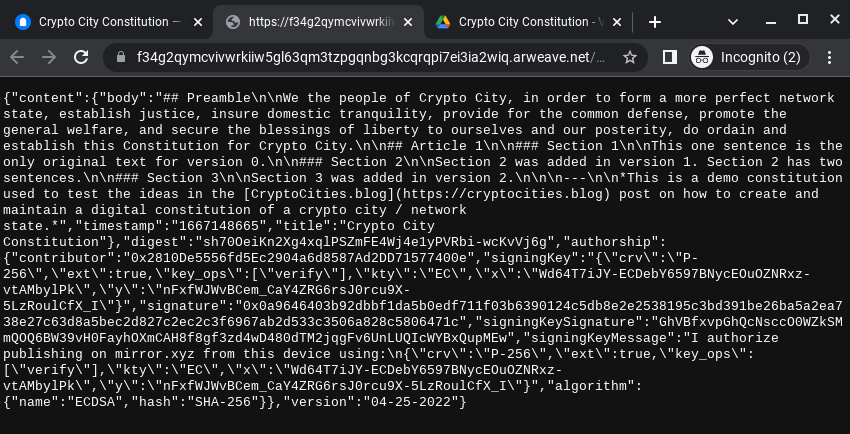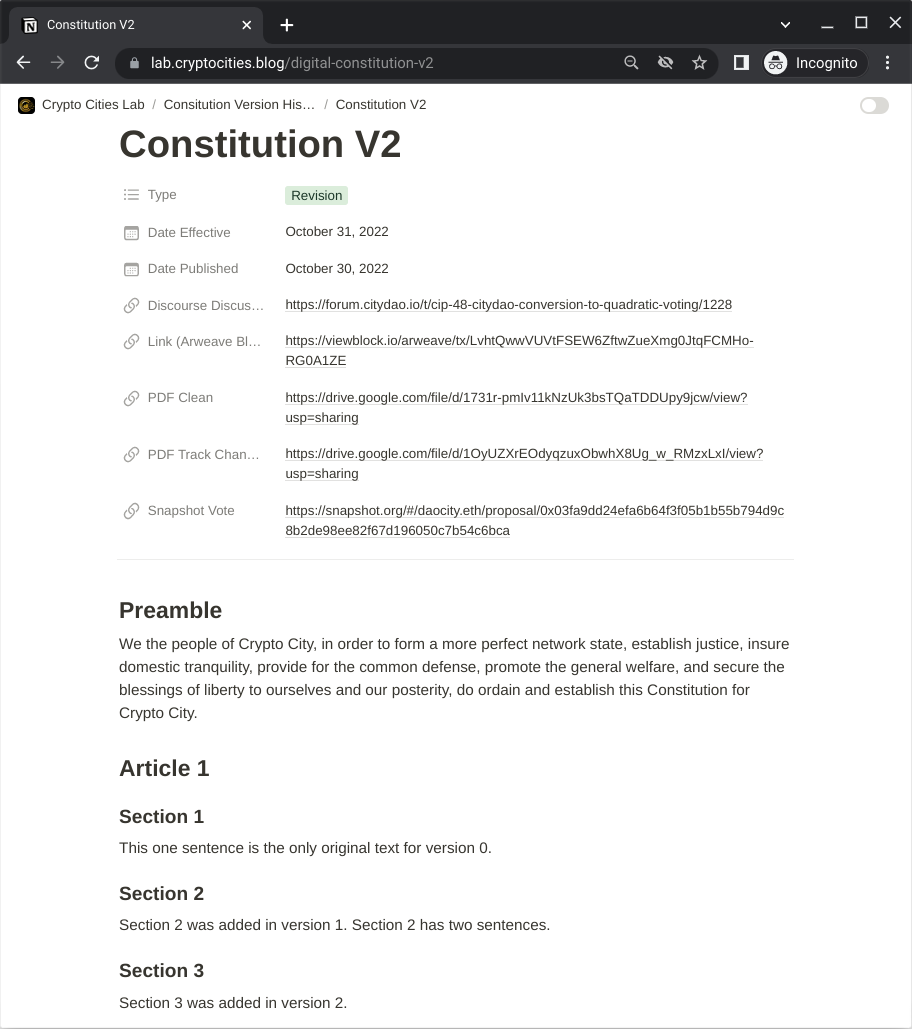Constitutions Belong on the Blockchain
Here's exactly how I'd do it; complete with screenshots and mock-ups.
How many U.S. citizens have actually seen the U.S. Constitution? The actual piece of paper - not a picture, a pamphlet, or text on a website. I’m guessing its not many. I live in Washington, DC and I haven’t even seen it.
In theory, all these websites that have the text of the U.S. Constitution could be saying something different (intentionally or unintentionally) than the original and I wouldn’t know. I’m not actually worried about this for the U.S. Constitution - its easy enough to go and see the real thing,1 and there are so many photos and official websites with the text that someone would catch the error.2 But, it should be easier to view the original primary source and know for sure that it hasn’t been changed.
In the new world of digital organizations, DAOs, and eventually crypto cities and network states, this will be even more important. Founding documents today are created quickly, edited quickly, and are all online. Citizens who are distributed across the globe must be able to easily verify that they are looking at a legitimate version of the constitution, without having to make a pilgrimage somewhere 1,000s of miles away.
Publishing constitutions on the blockchain seems like a perfect solution for these problems. A constitution stored on the blockchain would be easily viewable to anyone with an internet connection (no trip to the National Archives required!), and easily verifiable as the original - since it would be stored on an immutable chain. So how exactly would this work?
How to Publish Your Constitution on the Blockchain
Below I offer one way that a crypto city or DAO could store its constitution on blockchain, using only freely available tools (Mirror.xyz, Notion.so, and Google Docs). It is based heavily on my experience of watching the first constitution and subsequent edits play out in CityDAO.3 In the future, there may be even better tools - designed specifically for blockchain native regulatory documents to be stored and displayed,4 but this is the best I’ve come up with so far.
Constitution Version 0.0
After you’ve gone through your community process of creating a constitution (probably in Google Docs) and it gets ratified through a digital vote (probably in Snapshot), it needs to go on the blockchain. There are a lot of different ways you could accomplish it, but the simplest and most citizen-friendly way seems to be publishing it as an article on mirror.xyz using the DAO’s account. The resulting finished product is essentially a blog post with a web address, which makes it easy to access (anywhere you have internet) and easy to copy, paste, or search via Ctrl-F. Mirror.xyz’s core innovation is that every article is published on a blockchain, so you can have confidence that what you are looking at is the truth (or at least you’ll be able to easily verify if it isn’t).
The screenshot above (view the actual post here) is what it might look like, but instead of nicholas.bonard.eth as the author in the top left corner and in the URL, it would be [crypto city name here].eth.
Amending Your Constitution
If you only ever have one version of your constitution and never make amendments, then you can stop with the step above. But let’s be real, its going to have edits. Edits and amendments are natural, and governments have a responsibility to make it easy for people to see how the constitution has changed over time.
Unfortunately, Mirror.xyz doesn’t have a way to visually view track changes. Google Docs does, but doesn’t offer the verifiability of blockchain. So we need a system that allows us to link a Google Doc to the corresponding edit on the blockchain.
In this case, I’m giving an example using Notion, because of its database functionality and clean, easy to publish interface. In theory this could be done with something as simple as a spreadsheet or a table that you display on a web page.
The screenshot below is what a Crypto City’s Constitution page might look like. See an interactive version in Notion with this link.
Breaking Down the Constitution Tech Stack
Let’s take a look at Constitution V2; the current version of the Crypto City Constitution.
Mirror.xyz
The link to the constitution on Mirror.xyz (https://mirror.xyz/nicholas.bonard.eth/bH21BKxp8k7fl23GedebtQvjTx-FEchi96S9DSSeZvQ) will always show the most current version of the document, so you won’t know you are looking at something was edited. It’s essentially a blog post. Note that even the date on the screenshot below reflects the date of the original constitution, not the date of the most recent update.
Arweave (this just happens in the background)
Mirror.xyz works by using the Arweave blockchain. Anytime you hit “publish” on Mirror, it saves the text in your (new or edited) post as a transaction on the Arweave blockchain. Every update is therefore captured on the blockchain, while still allowing the URL to the constitution on Mirror.xyz to remain the same. Below is the Arweave transaction page for the V2 update to the constitution. Note that the “Original-Content-Digest” section in the screenshot below matches the “Content Digest” at the bottom of the Mirror.xyz page (screenshot above). If you want to see all the Arweave transactions related to the constitution (as an easy way to check to see if there have been rogue updates beyond what was approved by a DAO vote), it requires a little more set up, but is possible.
Just in case you are thinking that you might as well just use the Arweave transaction page as the official Crypto City Constitution, take a look at what the formatting will look like if you click the Arweave.net Link in the page above. Its not pretty!
Google Docs
When you are in the process of proposing changes to the constitution and doing group edits, its hard to imagine a better service than Google Docs. Its free, everyone can work on it together at the same time, and you can be in “reviewing” mode which will allow you to see track changes. And then once you are ready to put it up for a vote, you can share a PDF that shows those track changes (see screenshot below), so that the differences between it and the current version of the constitution are obvious.
But, you can’t just use a Google Docs to “store” your constitution, because it could be easily changed by whomever has rights to edit it. Or, if you use a PDF, that could easily be doctored.
Notion
In addition to having the table that matches the Arweave transaction to the track changes Google Docs PDF, every constitution entry is its own separate page that also contains a selectable text version of the constitution. The screenshot below and this link shows you what the Constitution V2 page looks like. Notion could conceivably replace Google Docs in this constitution tech stack, as it does offer some limited track changes capability5 but its still missing the blockchain capability.
Final Thoughts
The process I outline above doesn’t remove all room for human error or bad actors. Ultimately one or more real people have login rights to the crypto city Mirror.xyz account and could push an update to the constitution that wasn’t ratified by citizens. But because there is a record of every change on the blockchain, a rogue update could be easily spotted and changes reversed. This radical transparency helps ensure the legitimacy of the government and putting constitutions and other key documents and regulations on chain is small step towards creating better governance systems for the future.
Tags: hashGovernance
Footnotes
If you really want to get all conspiracy theorist, you could question whether the copy that is stored at the National Archives is the actual original version. That seems far fetched, but if you want to believe it, it further proves the point. With physical documents that are very old, it is very difficult to prove chain of custody and that it was never “swapped out.” A constitution on the blockchain fixes this, because the moment it is ratified, there is a transparent record of its creation and any edits.
Wouldn’t it be crazy if an innocent transcription error 200 years ago during the creation of the first few new copies of the document led to us using some slightly different version? And that the slight difference turned out to be meaningful? Something like accidentally changing and “or” to an “and”…
CityDAO calls their constitution a charter, but it’s the same thing.
My wish is for Mirror.xyz, the U.S. Governments E-CFR website, and UpCodes to have a baby. Basically a tool that would combine the blockchain component of Mirror.xyz, the ability of the CFR (Code of Federal Regulations) to show a tracked changes version of a regulation between ANY TWO DATES of your choosing, and the ease of navigation/ ability to hover over special words to get definitions of UpCodes.
Notion does offer the ability to see when/what updates are made to a page, but in the free or pro versions you can only see the last 30 days of changes. If your Crytpo City had an Enterprise account, then you could see all the changes.





